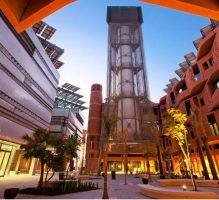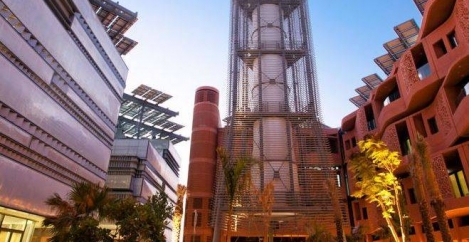September 14, 2016
Study shows how a green city in the desert still has much to teach the world 0
 A much publicised but occasionally troubled green city in the United Arab Emirates without light switches or water taps has much to teach people around the world about saving energy and precious resources, claims a new study from researchers at Birmingham University. With its low-rise and energy efficient buildings, smart metering, excellent public transport and extensive use of renewable energy, the 2,000 citizens of Masdar City in Abu Dhabi, are living in a place which is a ‘green’ example to city planners around the globe, claims the report. There are no light switches or water taps in Masdar City. Movement sensors control lighting and water in order to cut electricity and water consumption by 51 percent and 55 percent respectively. Masdar is a mixed use development that is the world’s first city designed to be ‘zero carbon’ and ‘zero waste’. Masdar City is a large-scale mixed use development which lies 17 kilometres south-east of the city of Abu Dhabi.
A much publicised but occasionally troubled green city in the United Arab Emirates without light switches or water taps has much to teach people around the world about saving energy and precious resources, claims a new study from researchers at Birmingham University. With its low-rise and energy efficient buildings, smart metering, excellent public transport and extensive use of renewable energy, the 2,000 citizens of Masdar City in Abu Dhabi, are living in a place which is a ‘green’ example to city planners around the globe, claims the report. There are no light switches or water taps in Masdar City. Movement sensors control lighting and water in order to cut electricity and water consumption by 51 percent and 55 percent respectively. Masdar is a mixed use development that is the world’s first city designed to be ‘zero carbon’ and ‘zero waste’. Masdar City is a large-scale mixed use development which lies 17 kilometres south-east of the city of Abu Dhabi.
Masdar was established in 2006 by the Abu Dhabi Government with a view to building “the world’s most sustainable city” of 40,000 people with 50,000 commuters by 2025. Sustainability experts at the University of Birmingham conducted a detailed study comparing energy supply and use in the two cities. They have identified a set of five core ‘lessons’ as part of their research, which is published this month in Renewable and Sustainable Energy Review.
The city is designed to encourage walking, with any nearest public transport link being within a maximum walking distance of 350m. Residents and commercial tenants can walk or use public transportation for all their needs within Masdar City. Masdar City’s buildings are only permitted to be up to five stories high, and are built on narrow streets, with rooftops covered with solar panels and street-level “solar canopies” providing shade. The shaded paths and narrow streets are designed to create a pleasant environment in which to walk in Abu Dhabi Emirate’s hot climate.
[embedyt] https://www.youtube.com/watch?v=Llzq9YMsPP8[/embedyt]
Lead researcher Susan Lee, from the University’s School of Civil Engineering, said: “We compared two very different cities – both aspiring to be ‘low-carbon’. Masdar has started well by building low-rise, energy-efficient buildings with smart metering. Data from such buildings can help to change people’s behaviour and help develop more energy-efficient new and retrofitted UK buildings. The UAE is a hot and arid place; experience gained in Masdar will help us plan here in the UK for projected hotter summers, with more frequent heatwaves, particularly in cities, as the climate changes. As an established city, Birmingham has been flexible in adapting to new energy requirements and has much to teach Masdar. For example, the University of Birmingham’s research into cars powered by hydrogen fuel cells could help the UAE city’s desalination plants to develop a valuable energy source.”
The Birmingham research team’s ‘lessons learned’ cover the following key areas:
- Innovation and experimentation. Innovation requires talented people and, often but not always, money. Masdar City benefits from attracting talented citizens, students and businesses and from access to generous national funding. Birmingham has limited means to experiment with alternative energy opportunities, thus impeding its practical progress.
- Lock-in. Energy supply and demand are part of a complex system-of-systems when linked with other resources such as water, food and other city systems. Masdar City benefits from starting from a blank slate, whereas Birmingham has existing processes, procedures and an ageing infrastructure to negotiate.
- Balance. Economic, societal and environmental aspects of sustainability are all critical. Unduly emphasising one can lead to negative consequences for the others. There is evidence that Masdar City is concentrating on economic goals at the expense of social cohesion. During the 20th Century, Birmingham did the same, focussing on the car industry.
- Resilience. Despite increasingly-sophisticated predictions of the future, none are reliable. Masdar City and Birmingham must both make efforts to future-proof the decisions they take today so that they continue to deliver what was intended, into the future.
- Governance. Both cities have vision statements that include aims to be as sustainable and resource secure as possible. To be successful, these aims must run through all city policies and sit at the heart of its vision.
The team analysed each city’s energy flows within the context of their respective country’s energy systems. They worked within the framework of the ‘Urban Metabolism’ theory whereby each city is viewed as a living organism which is constantly restructuring and developing.















